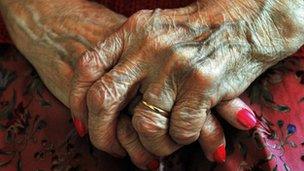NHS end of life care good but choice lacking
- Published

Hospices came out top for end of life care with dignity and respect
The quality of NHS end of life care is good but choice is still lacking, a <link> <caption>survey</caption> <altText>National Bereavemnet Survey</altText> <url href="http://www.ons.gov.uk/ons/rel/subnational-health1/national-bereavement-survey--voices-/2011/index.html" platform="highweb"/> </link> of bereaved people reports.
Around 22,000 people responded to the first ever survey that measured care leading up to death - published by the Office for National Statistics.
There were high levels of satisfaction with hospices, but hospitals, where most died, had the lowest ratings for care with dignity and respect.
For those who expressed a preference, the majority preferred to die at home.
Only 30% of people who died in hospital were given a choice about where they died, said relatives, compared to two-thirds of those who died in a hospice.
Hospital vs hospice
The National Bereavemant Survey, commissioned by the Department of Health, reported that three quarters of people in England thought the overall quality of care given in the last three months of life was good, excellent or outstanding.
But when asked about if the patient was treated with dignity and respect - responses varied depending on the care setting. Only half of hospital nurses were thought to have shown dignity and respect to their patient, compared to four fifths of hospice nurses.
Imelda Redmond, from Marie Curie Cancer Care, said:
"Hospitals are letting people down at a crucial time and this poor care is leaving behind memories of loved ones being treated with little dignity and respect, and dying in pain. This is simply not good enough.
"Good quality care can be provided at the end of life. The care received in hospices and at home was highly regarded by relatives. We only have one opportunity to get end of life care right.
"There is no reason why we can't provide a dignified and respectful death, regardless of setting, location or diagnosis."
Sarah Wootton, Chief Executive of Dignity in Dying, said the survey was "encouraging" although more work needs to be done.
"There is still a long way to go to ensure that people are dying in their preferred place of care, and that care and treatment at home is as good as care in hospital and hospice.
"The other area of end of life care which needs more work and investment is the involvement of patients in the decisions made about their care, and the recording of those decisions."
Co-ordination needed
Care services minister Paul Burstow said: "All people, regardless of their age or condition, should get the best quality care at the end of life.
"The results of this survey will be carefully studied by NHS and social care professionals. It reveals a wide variation in the quality of care across the country.
"There is more to be done to improve both the way care is co-ordinated for people in their own homes and the quality of care in hospital."
Professor Sir Mike Richards, national clinical director for end of life care, said the survey was a "key step" in addressing the lack of data on end of life care services.
"For the first time, it provides us with information about people's quality of care across all care settings, and enables us to see how this varies across the country."
Thought out strategy
The survey delivered on a commitment made in the 2008 <link> <caption>End of Life Care Strategy</caption> <altText>End of Life Care Strategy</altText> <url href="http://www.dh.gov.uk/en/Publicationsandstatistics/Publications/PublicationsPolicyAndGuidance/DH_086277" platform="highweb"/> </link> that stated surveys of bereaved relatives would be used to monitor care.
It contained 59 questions, addressing a broad range of issues including co-ordination of care, patients' involvement in decisions and support for carers.
Surveys were sent to 48,766 people who had a bereavement between November 2010 and June 2011. Forty-six per cent of surveys were returned completed.
- Published7 December 2011